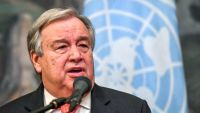The European Commission has started work on a new European migration policy, just one day after a new tragedy off the coast of Sicily claimed the lives of 10 migrants.
Italy's coastguard has carried out seven rescue operations in a 24-hour period, saving 941 migrants in the Strait of Sicily, the body of water that separates the Italian island from the coast of North Africa. Speaking at a press conference Wednesday, European migration commissioner Dimitris Avramopoulos alluded to Tuesday's "tragic events" and reasserted the need for a long-term European migration policy to respond to a record influx of migrants from war-torn countries like Syria and Libya.
Avramopoulos and first vice-president Frans Timmermans announced that, in light of a "heightened sense of urgency," the commission would deliver its immigration reform in May, two months ahead of schedule. Avramopoulos also stressed the need "to think about all the dimensions of migration," adding that the comprehensive European Agenda on Migration was "not about quick fixes, but about creating a more secure, prosperous, and attractive European Union."
Over the next few months, the European Commission will focus on four key areas: improving legal migration channels, cracking down on illegal immigration and people-smuggling, securing Europe's external borders, and investing in a strong common asylum system.
Avramopoulos called for better collaboration between EU member-states, and asked countries to "put an end to the blame game."
Central to Europe's common migration policy is the revised Dublin Regulation — Dublin II — a set of rules that determine which member state is responsible for processing a migrant's asylum claim. Both the European Council on Refugees and Exiles (ECRE) and the UN High Commission for Refugees (UNHCR) have highlighted the many failures of the Dublin Regulation, a system they say violates the rights of migrants.
According to Dublin II, migrants' claims can only be processed by one member state at a time — the state through which the migrant entered Europe. So if an illegal migrant enters Europe through Greece and is registered there, he or she has to file an asylum claim in Greece.
Given that asylum legislation and infrastructure vary massively from one European country to another, some migrants will do anything — including escaping from reception centers — to avoid being registered in certain countries.Reporting from the French port of Calais in January, VICE News heard stories of migrants burning the tips of their fingers to avoid being fingerprinted and registered within a certain country's system.
Critics of Dublin II also say the treaty imposes unfair rules, causing uneven distribution of migrants' claims and foisting the lion's share of asylum claims on countries along the Mediterranean route.
François Gemenne, a researcher at the Paris Institute of Political Sciences and an expert on the governance of migratory flows, told VICE News that the Dublin II Regulation was adopted to "prevent migrants from 'shopping around' for asylum, i.e., filing several claims at the same time, in different countries."
"The Commission needs to realize the great many adverse effects caused of this regulation, which puts a greater burden on those countries that are located on the front-lines of migration," Gemenne said, adding that a fairer solution would be to distribute asylum claims among the various member-states, and standardize the criteria for granting asylum.
Establishing a common policy is no easy task, however, as it would need the sign-off of all EU member states.
According to a survey by European border control agency Frontex, which was obtained by French daily Le Figaro, 274,000 illegal migrants entered Europe illegally in 2014 — a 180 percent increase from the previous year. The dramatic increase of migrants and refugees fleeing war-torn countries has turned human trafficking into a lucrative and highly organized activity.
Greater collaboration between member-states, with back-up from Frontex, which manages cooperation between Europe's national border guards, will be central to the commission's efforts to reduce trafficking. Beyond a stronger sense of community, the commission has requested better cooperation with the countries of origin and migrant transit to help fight against smuggling and so-called death boats.
For Gemenne, the establishing of legal immigration channels is key in the fight against people-smuggling. The researcher explained that border policy itself has little impact on migratory flows, which are determined by structural factors, such as war and conflict. "The people-smugglers are first and foremost the consequence of the EU's restrictive asylum and immigration law," Gemenne told VICE News. "The smuggling business has been nurtured by fortress Europe and by the shutting down of Europe's borders."
Smugglers often cram hundreds of migrants onto vessels that are barely seaworthy, without access to life preservers. According to the Frontex report, the smugglers "often salvage boats used in previous crossings that have been left to drift [by the coast guards] after the passengers were rescued, bringing these vessels back to Libya to reuse them."
The report also reveals that migrants who are unable to afford the $1,650 trip are sometimes asked to settle their debt "as laborers or organ donors" once they have arrived.
Frontex reported that 9,376 smugglers had been arrested in 2014, which was a 31 percent increase over 2013.
Source: Vice News





